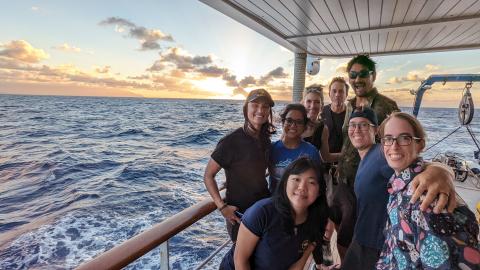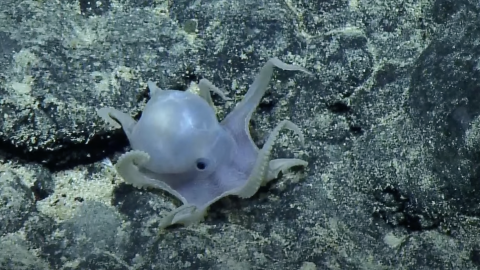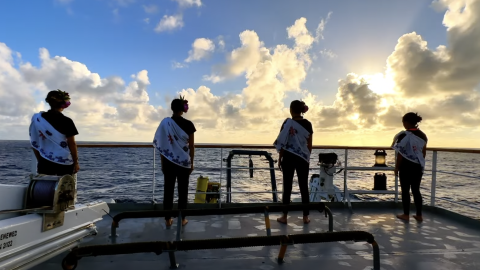Ala ʻAumoana Kai Uli: Naming an Expedition to Papahānaumokuākea Marine National Monument
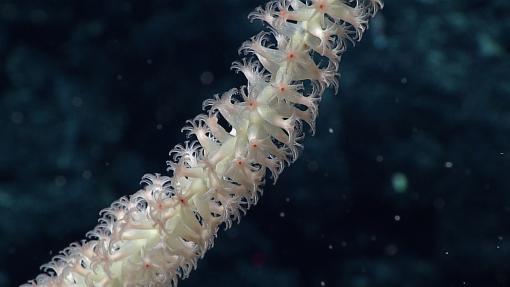
Luʻu a ea, a hiki i ke kai lipolipo,
Luʻu a ea, a hiki i ka papakū (e),
Luʻu a ea, a hiki i ke kualono kai,
Luʻu a ea, a hiki i ke kumu (e),
Luʻu a ea, a hiki i ka wawā a Palaoa,
Luʻu a ea, a hiki i ka papa hākuʻi wawā,
Ala ʻaumoana kai uli,
Ola i ke au a Kanaloa!
Dive and rise, until reaching the deep blue ocean,
Dive and rise, until reaching the sea floor,
Dive and rise, until reaching the sea ridge,
Dive and rise, until reaching the foundation (of the ocean/islands),
Dive and rise, until reaching the echoing sound of Palaoa
Dive and rise, until reaching the reverberating echo of the ocean floor…
Path of the deep sea traveler
Life to the realm of Kanaloa!
Hoʻolauna | introduction
In collaboration with the Ocean Exploration Trust (OET), former Kānaka (Native Hawaiian) OET interns, the National Oceanic and Atmospheric Administration (NOAA), and members of the Papahānaumokuākea Marine National Monument (PMNM) Native Hawaiian Cultural Working Group (CWG), we present the name Ala ʻAumoana Kai Uli (path of the deep sea traveler) to the upcoming expedition NA154.
Ala ʻAumoana Kai Uli | name description
Ala - path; to rise up, arise
ʻAu - to swim, travel by sea
Au - current; period of time
ʻAumoana - to travel on the open sea; nautilus (the sea creature)
Aumoana - ocean current; era of the ocean
Moana - ocean
Moana Kai - deep sea
Kai - sea
Uli - blue, as in the deep ocean
Kai Uli - deep blue sea
The naming group offers the name, Ala ʻAumoana Kai Uli, or path of the deep sea traveler, which not only speaks to the work that will be done on this upcoming expedition but the name also speaks to the responsibility and accountability that we have to each other in protecting our shared ocean. Ala ʻAumoana Kai Uli is a reflection of our collective experiences as people who love and protect the ocean. This name incites images of physical and metaphoric paths, connecting ocean people to each other and various spaces within the ocean. These paths have been meticulously tended to over time, but the name also reminds us of our continued shared responsibility to care for these paths and our ever-developing relationships.
ʻAumoana, to swim in the ocean, is coincidentally glossed as nautilus, the name of OET’s exploration vessel. Not only does it honor the name of the ship, but also the work and the function of the ship and those on/off ship before, during, and after the exploration process. Au (without the ʻokina, or glottal stop) is glossed as current. When modified by the term, moana, as in Aumoana, it now references the ocean currents—paths within the ocean that connects one space to another. Aumoana in the name is used as a reflection and a metaphor for our interconnectedness and relationality to each other, but more importantly, the ocean. The phrase, Aumoana, also has another meaning—era of the ocean. All people in some way have relied on (and continue to rely on) the ocean. In a sense, it has also been an ocean era. However, Aumoana in the name also reminds us of how increasingly important it is that we as humans think about what we do today as it impacts the ocean. Ala ʻAumoana then is our call of action—let us rise up to physically and symbolically swim in the currents to create a deeper relationship with and understanding of the ocean.
The various terms Moana, Moana Kai, Kai, Kai Uli, and Moana Kai Uli describe the layered spaces of the ocean. These spaces are those that the expedition will be working in. As a whole, the ocean itself not only offers us physical substance but also provides spiritual and mental nourishment that represents the depths of knowledge we as humans hope to attain.
At the current moment, there are no plans immediate plans to return to PMNM after this expedition. As such, members of the naming group felt it appropriate to deviate from the “luʻu a ea, a hiki i” format to formally and properly pani (close) this series of exploration. This, however, does not indicate the ending of a relationship. Like the deep sea currents, things are continually moving and developing. We turn to the depths of the ocean knowing that the currents will once again bring us back together again.
A Note on Hawaiian Names
Names possess power. This power is harnessed each time it is spoken, written, or chanted. Each line in the oli (chant) ends with the expedition name that reflects/specifies the purpose and function of the voyage. The repetitive action of the oli enables the chanter to set their intentions, present themselves with respect, and deepen their relationship with the place. Once participants learn the oli and the meaning of the names as well as the purpose and intention of the oli and names, only then is it appropriate to refer to the name of the expeditions by their shortened names. For example, this expedition may be referred to as simply, “ʻAumoana”
Listen & Learn - Pronunciation Sound Clips
More Resources
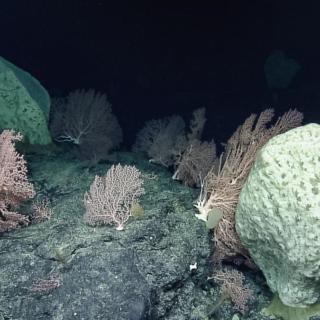
Ala ʻAumoana Kai Uli in Papahānaumokuākea Marine National Monument
Ocean Exploration Trust and partners will conduct a telepresence-enabled expedition to explore unseen deep-sea habitats aboard E/V Nautilus with ROV and seafloor mapping operations in the Papahānaumokuākea Marine National Monument (PMNM) focused on the largely unexplored northwestern section of the Monument.
